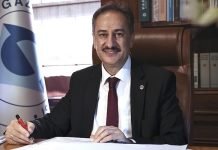A witness testified in court last Thursday, describing signs of apparent torture inflicted on a former teacher while he was in detention following a coup attempt in Turkey in 2016, the TR724 news website reported.
The Antalya 3rd High Criminal Court on Thursday held the second hearing in the trial of three police officers charged with torturing Eyüp Birinci and a doctor accused of failing to document it. Birinci, a former geography teacher, was detained for alleged links to the faith-based Gülen movement, inspired by the late Muslim cleric Fethullah Gülen.
Birinci claimed he was sexually assaulted, beaten and insulted while in custody at the Antalya Police Station.
Furthermore, he said Dr. Fevzi Yılmaz, who examined Birinci for four consecutive days in the attorney consultation room at the police station in Antalya, did not document the physical injuries inflicted as a result of the alleged torture despite visible bruises and issued a medical report saying he had fallen down the stairs.
President Recep Tayyip Erdoğan has been targeting followers of the Gülen movement since corruption investigations revealed in December 2013 implicated then-prime minister Erdoğan as well as some members of his family and inner circle.
Dismissing the investigations as a Gülenist coup and a conspiracy against his government, Erdoğan designated the movement as a terrorist organization and began to target its members. He intensified the crackdown on the movement following an abortive putsch in 2016 that he accused Gülen of masterminding. The movement strongly denies involvement in the coup attempt or any terrorist activity.
Birinci’s plight in police custody was witnessed by another detainee, former teacher Fevzi Akça, who said he shared a cell with Birinci for several days and witnessed his physical and psychological deterioration. Akça said when he first saw Birinci, the teacher was lying face down, unconscious, and covered in blood. “His clothes were soaked in blood. He began to regain consciousness after about an hour or two and told me he had been beaten by officer Muhsin Türkel,” Akça said.
Akça recalled that Birinci was unable to sit or stand and appeared to drift in and out of consciousness. “He couldn’t even open his mouth to drink water,” Akça told the court. “We shouted for help. When the police arrived, they took him away in a panic.”
He also described a second incident roughly 10 days later in which Birinci returned from an interrogation session in visibly worse condition. “He was dropped off by the officers. He couldn’t walk or stand. He was completely unresponsive,” Akça said. “We tried to help him sit down, but he collapsed.”
After Birinci fainted, he was taken to a hospital where it was determined that he was experiencing internal bleeding. Birinci’s colon had ruptured from torture inflicted with a police baton.
Dr. Oğuz Gürbüz, the physician at a public hospital in Antalya who treated Birinci after his condition deteriorated, told the court the former teacher was brought in with severe abdominal pain and internal bleeding. “He was not in a condition to speak. His life was in danger,” Gürbüz said.
Turkey’s Constitutional Court ruled in 2021 that Birinci’s rights had been violated, citing credible allegations of torture and the authorities’ failure to conduct an adequate investigation. It ruled that Birinci be paid 40,000 Turkish lira in compensation for the acts of torture he suffered in police custody.
That ruling led to the current criminal case against the officers and physician.
Birinci was arrested in July 2016 and was sentenced to almost nine years in prison on terrorism charges due to his alleged Gülen links. He was released from prison in April 2022 after serving his sentence.
Birinci was also among some 130,000 civil servants who were removed from public service due to their alleged links to terrorist groups. He was also fired from his job as a geography teacher at a high school in Antalya by a government decree in 2016.
Allegations of torture and mistreatment have become worryingly common in Turkey following the coup attempt, when thousands of people were detained and arrested on bogus terrorism or coup charges.
According to a report by the UN special rapporteur on torture and other cruel, inhuman or degrading treatment or punishment, on his mission to Turkey from November 27 to December 2, 2016, “torture and other forms of ill-treatment were widespread” in Turkey.
The report found there were numerous consistent allegations received by the special rapporteur in the immediate aftermath of the failed coup and that torture and other forms of ill-treatment were widespread.
The special rapporteur heard persistent reports of severe beatings, punches and kicking, blows with objects, foot whipping, threats and verbal abuse, being forced to strip naked, rape with objects and other sexual violence or threats thereof, sleep deprivation, stress positions and extended blindfolding and/or handcuffing for several days, according to the report.















